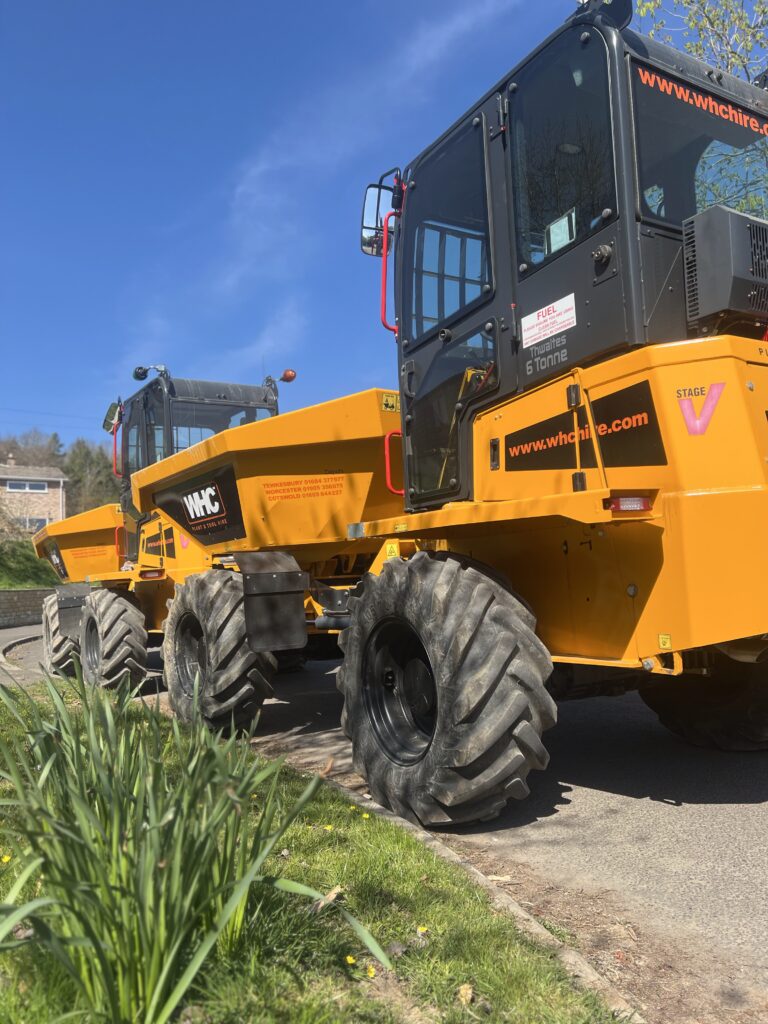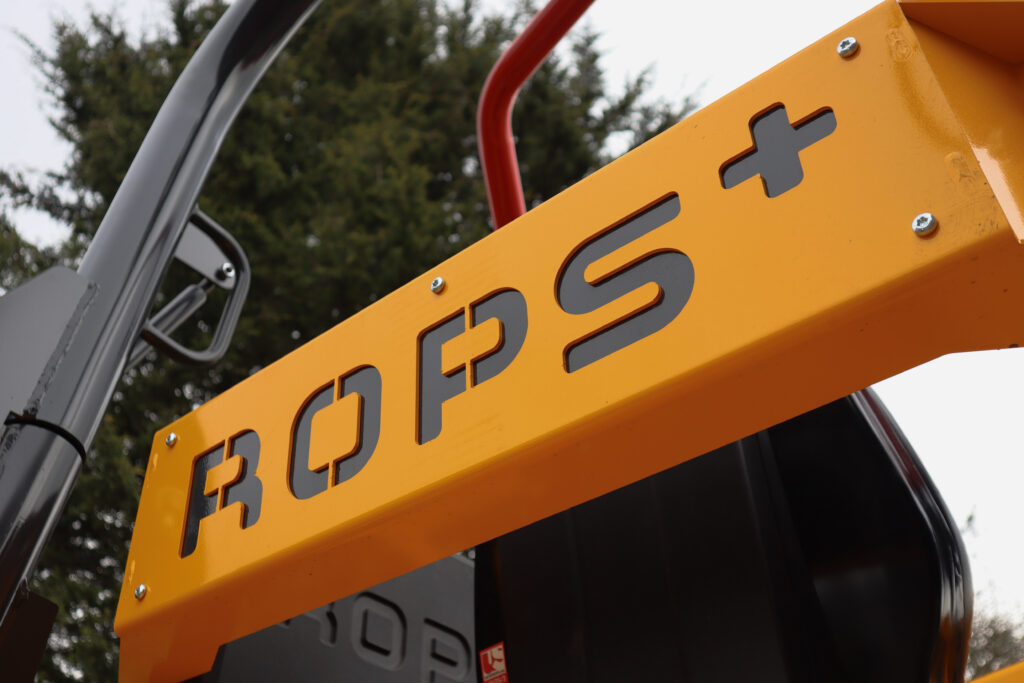Cabbed Vs ROPS+ Front Mounted Dumpers- Addressing Hire Options.
Which is best? Cabbed Vs ROPS+ front-mounted dumpers? If you are considering hiring a dumper with an operating mass between 3.5 and 4.5 tonnes, then great news! Your options just got bigger! Both cabbed and ROPS+ dumpers provide a wide range of operational advantages to assist with daily earthmoving tasks.
Most important of all, each model offers new technologies designed to enhance safety when using this machinery.
In this article, we are going to address front-mounted dumper hire options that you can expect within this weight category. We’ll cover how these machines match up against new legislation and outline the pros and cons of each design. So when it comes to choosing the right dumper for your project, you’ll have all the facts.
Let’s see how these new dumper designs fit into part 6 of the latest dumper legislation.
New Legislation for 3.5-4.5 Tonne Forward Tipping Dumpers
The legislation of the manufacture and operation of forward-tipping dumpers changed in February 2025. This included some additional requirements to be added to designs with an operational mass between 3.5 and 4.5 tonnes.
Part 6: states that front-mounted dumpers ‘’with an operating mass of over 3,500 kg & under 4,500kg shall be provided with an additional means, to prevent the operator from being ejected from the overall dimensions of the machine in the event of a machine tip-over or roll-over.”
So what does this mean for dumper manufacturers?
Ultimately, major manufacturers and rental providers have had to adjust their offerings to comply with these changes.
What Dumper Designs Can You Use Under Part 6 Of The New Legislation
Part 6 of the new dumper legislation provides businesses with two different dumper design options to choose from.
Firstly, a fully cabbed model which you’d expect to see on larger machines. Or, alternatively, a dumper with additional safety measures fitted. Thus providing a more familiar design to what many operators may already be used to.
Here are some examples of both front-mounted dumper designs

Cabbed Models
Cabbed dumper designs offer all-around protection for the operator providing the seatbelt is fitted correctly.

Open Cab Models
Open cab designs like this ROPS+ model, provide additional padding and protection for the operator in the event the machine is to overturn.
Now that we have highlighted two different front-mounted dumper designs that adhere to part 6 of the latest legislation, let’s take a closer look at the pros and cons of opting for each design.
Pros Of Cabbed Front-Mounted Dumper Designs

There are a huge number of pros to choosing a cabbed dumper for your construction project. Consider these when choosing different types of front-mounted dumpers affected by new legislation.
1. Enhanced Operator Safety
The highlight of cabbed dumpers is their enhanced safety structures:
Roll Over Protection Structure (ROPS)
This production-fitted structure protects the operator should the machine overturn. Note: This is not effective if the seatbelt is not worn.
Fall On Protection Structure (FOPS)
This structure prevents the operator from being crushed should debris fall on the cabin. This is ideal for quarry and forestry work.
Reduced Elements Exposure
The cabin protects from dust, fumes and other airborne exposures.
2. Operator Comfort
Cabin designs provide dumper operators with superior comfort:
Weather Protection
Keeping operators shielded from harsh conditions, therefore reducing fatigue.
Climate Control
Cabbed dumpers are fitted with heating and cooling systems, offering a comfortable all-year-round environment.
Reduced Noise & Vibrations
The enclosed cabin helps to reduce external noise and vibrations that operators are exposed to. Overall improving the user’s experience.
3. Higher Productivity
Cabbed dumpers are linked to higher productivity levels due to:
Longer Operational Hours
Operators are able to work more hours and in a wider variety of conditions, which is ideal for UK construction projects.
Less Operator Fatigue
Higher levels of productivity are achieved due to the reduced amount of exposure to the elements.
Cons Of Cabbed Front-Mounted Dumper Designs
While the pros of using a cabbed dumper are highly beneficial towards operator safety, you should be aware of the following:
1. Reduced Visibility
The fitting of production-fitted cabins does affect the operator’s visibility:
Limited Peripheral Vision
Cabbed dumpers can create troublesome blind spots compared to open cabbed dumpers.
Restricted Over The Side View
Makes the offloading view more restricted and more dependent on mounted camera systems.
2. Limited Operational Specifications
While the fitting of a cabin does boost safety, it does have some limiting operating factors:
Limited Turning Circle
Fitted cabins reduce the turning circle of front-mounted dumper designs.
Less Manoeuvrable
Manoeuvrability in tight spaces is limited due to the cabin structure.
3. Additional Weight/Size
Production-fitted cabins can add a huge amount of weight. Additional weight can cause problems with:
Sensitive Ground
Heavier dumpers can cause more traversing damage on sensitive ground projects, while also affecting the machines’ manoeuvrability.
Harder To Operate
Heavier machines can be more straining to operate for long periods.
Pros Of ROPS+ Front-Mounted Dumper Designs

These new dumper designs were released to the market in 2025, offering a wide range of pros to operators. Unlike cabbed models, this style of earthmoving equipment is similar to the existing models already in use. These machines offer:
1. Superior Visibility
ROPS+ dumpers offer superior visibility compared to cabbed models, especially when it comes to tight access projects.
Unobstructed View
With no cabin fitted, operators have a better 360-degree view compared to cabbed designs.
Better Awareness of Surroundings
Without a fully fitted cabin, operators are able to hear and see what’s happening around them more clearly.
2. Faster Entry/ Exit
ROPS+ dumpers offer faster entry and exit access during the machine being loaded. This can save on cycle time while boosting project performance.
Quick Access
Ideal for projects that require frequent stops in between loading duties. With the assistance of additional handrails, operators can maximise their safety and efficiency when dismounting.
More Room To Manoeuvre
Without the restrictions of a production-fitted cabin, there is more room to easily enter and exit the machine’s operating seat.
3. Better Manoeuvrability
Without the restrictions of a fully fitted cabin, ROPS+ models can offer better manoeuvrability of the equipment. Ultimately making the machinery more suitable for tighter more complex tasks.
Improved Turning Circle
The turning circle of the dumper is drastically improved without a cabin installed. This can have a huge effect on travelling and cycle times.
Suitable For Tight Access
With the aid of a better turning circle, operators can use larger machinery in tighter spaces.
4. Lightweight
ROPS+ dumpers benefit from offering a lightweight solution on large dumper designs. Therefore, they are a more favoured choice for projects that involve a delicate touch.
Lower Ground Pressure
As they are lighter in weight, ROPS+ dumpers have less impact on soft soil or muddy ground, reducing the chance of getting stuck.
Better Fuel Economy
With a reduction in operation weight, comes a boost in fuel economy. While the difference may only be small, the impact will be drastic over long-term periods.
5. Familiarity
While cabbed dumpers have been around for some time, most operators will be far more familiar with ROPS+ designs, with the addition of some new safety features.
Safer Sites
Operators using equipment they are more familiar with, will in effect, boost safety across your construction sites.
Training
If operators have not completed up-to-date training on forward-tipping dumpers, then ROPS+ models are ideal.
Cons Of ROPS+ Front-Mounted Dumper Designs
While the introduction of ROPS+ dumpers offers clear advantages for many experienced operators, it’s important to recognise that they also come with certain drawbacks. These should be carefully considered when selecting the appropriate dumper under Part 6 of the new legislation.
That said, the following disadvantages generally apply to all open-cab dumpers, not just those with ROPS+.
Less Weather Protection
ROPS+ dumpers do not provide any weather protection for operators. While open-cabbed dumpers have been used for decades, it is still important to recognise this factor with alternative designs now available.
No Shelter From Wind & Rain
Operators are fully exposed to all the elements making shifts long and uncomfortable in bad weather.
Heat & Sun Exposure
Direct exposure to sunlight can be dangerous and exhausting for operators in the summer months.
Higher Risk Of Operator Fatigue
Without fully fitted cabins, operators are exposed to the elements all day. This can have a huge effect on fatigue levels, leading to avoidable accidents. Particularly exposure to noise, vibration, dust and fumes.
Noise & Vibration
Without a cabin, dumper operators are fully exposed to noise and vibrations created by the equipment and others on site.
Dust & Fumes
Users are also exposed to harmful dust and fumes that can be produced by the machinery or by other activities.
No Fall On Protection
One of the most notable drawbacks of ROPS+ model designs is their lack of overhead protection. This means they may not be suitable for certain tasks, especially in environments where there’s a risk of falling objects. It’s crucial to ensure appropriate safety measures are in place to protect operators from potentially life-threatening accidents.
Reduced Operator Comforts
Just like most open-cabbed dumpers of the past, they offer very little in terms of operators’ comforts. This can make working in more severe conditions difficult and reduce overall productivity.
No Climate Control
Unlike cabbed dumpers, these machines do not offer climate control which can make extreme weather situations harder to manage.
Lack Of Storage
ROPS+ models offer no storage, meaning users will have to dismount should they need anything. This can prove as an additional hazard on some construction sites.
Cabbed vs ROPS+ Forward Mounted Dumpers- Conclusion
Choosing between cabbed and ROPS+ front-mounted dumpers under the new legislation ultimately comes down to the specific demands of your project and working environment. While cabbed models offer superior comfort, protection from the elements, and advanced safety features, ROPS+ designs provide better visibility, improved manoeuvrability, and a more familiar setup for experienced operators.
Both models meet the latest Part 6 safety requirements for dumpers between 3.5 and 4.5 tonnes, however, understanding the pros and cons of each is key to making an informed decision that boosts productivity while maintaining safety on site.
Unsure which one to choose? Get in touch with WHC Hire Services today. As leading suppliers of forward-mounted dumpers in the UK, we have the experience, variety and availability to get your project moving. Speak to one of our experienced team or explore the range of forward-tipping dumpers we offer our clients.
Contact us via email: hire@whchire.com

